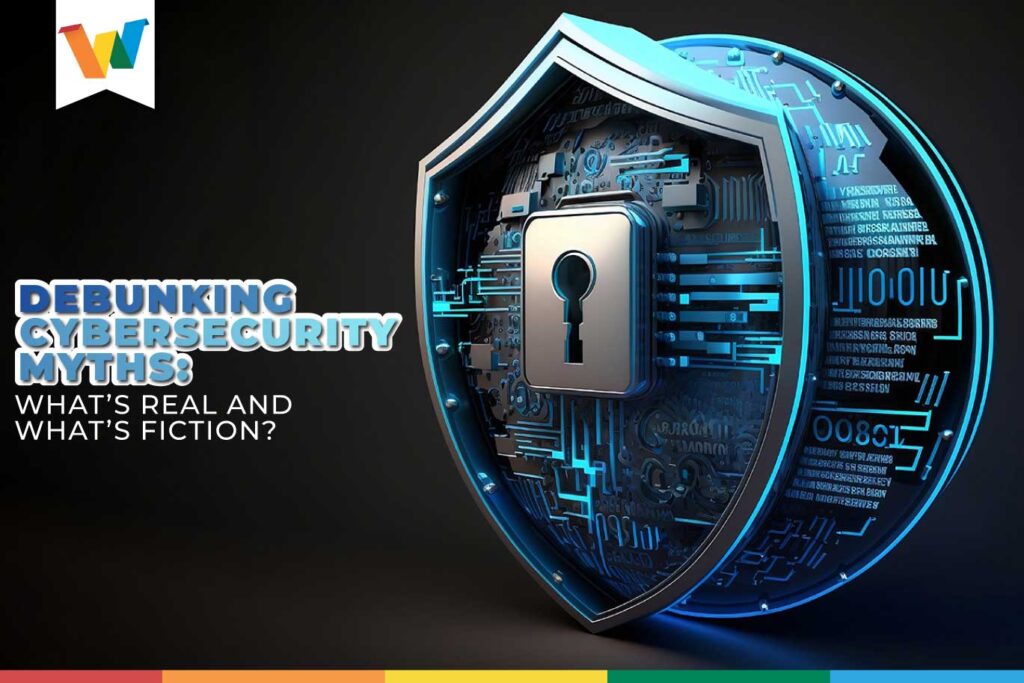Nowadays everything is on the Internet: entertainment, education, business, services, there are many sectors that are now in the virtual world, a non-tangible space that depends on cybersecurity to function properly. Because yes, just as there are risks in the real world, there are risks in the virtual world as well.
To understand this better, we must be clear about the concept of cybersecurity as the set of measures and equipment that aim to protect the data and computer security of a person or a company.
As technology continues to advance, the myths surrounding it increase, especially those about cybersecurity and the protection of our information on the Internet; so it is easy to fall into stereotypes and false information. But the truth is that many of these myths are just that: myths.
That is why today we invite you to review the most common myths about cybersecurity, when they are real and when they are fiction, and we will also give you some tips to protect your information on the Internet.
Myth #1: “I don’t have anything important on computers, there’s no way hackers will attack me, right?”
No, it’s not true. This is one of the first cybersecurity mistakes we make. A hacker does not attack only people with a lot of money or an important position. Hackers attack anyone with a vulnerable network or device. Your personal information, such as your ID or credit card numbers, email or bank account passwords, can be valuable information to a hacker.
As you can see, it’s not just important for important people. Cybersecurity is everyone’s business. But we’ll talk about that later.
Myth #2: “An antivirus should be enough”
Antivirus is important to protect cybersecurity, yes. But it is not enough as the only measure. Why? Because antivirus is only capable of protecting us from already known threats. And just like technology, there are always new threats developing in the world.
A good antivirus is like a bodyguard that protects your computer from viruses and other bad bugs that can do harm. It scans all the files on your computer, looking for code patterns that match those of known viruses. If it finds a virus, it deletes it or quarantines it so it can’t do any more damage.
It can also be complemented with a firewall, which functions as a kind of gatekeeper for your computer or network. It is responsible for reviewing all traffic entering and leaving your network and only allows access to data packets that comply with security policies. If any packet does not meet the requirements, the firewall blocks it.
So to ensure that your antivirus works at its best, you need the support of a firewall to protect your computer from external threats.
Myth #3: “My password is complicated, I’m safe”
Yes and no. Of course having something other than “1234” as your password is going to help you a lot. But hackers could gain access to your accounts through “phishing”, by force or by taking advantage of vulnerable parts of the software you use. We recommend using authentication factors such as Google Authenticator, Authy, Last Pass or Duo Security, as they are applications that generate time-limited verification codes to protect your account.
Myth #4: “It’s not that hard to identify a fake email”
Wrong. Nowadays, techniques have been perfected to manufacture emails that impersonate the identity of other people or even companies, so what used to be a simple task now requires more attention.
A hacker can use various social networking techniques to make their emails look much more legitimate, either by using a familiar name in your contact list or a well-known company logo. Be vigilant and do not click on suspicious links or download any attachments in the email unless you are 100% sure it’s safe.
Myth #5: “But Macs are not attacked by viruses”
We wouldn’t even know where to begin to explain this one. While it’s true that Mac computers are less likely to encounter a virus, that doesn’t mean they’re entirely immune. A Mac can be vulnerable to malware and other types of cyber threats. In fact, in 2015, a malware called XcodeGhost was reported to have infected some popular apps in the App Store, allowing attackers to collect user information. Also, in 2019, a phishing attack was discovered through a vulnerability in the “FaceTime Calls” feature that allowed attackers to listen in through the device’s microphone before the call was answered. Although these cases are rare, it is still important to exercise caution and keep the device’s software up to date.
Myth #6: “Mobile phones cannot be attacked by viruses”
Just like Macs, Android OS phones are also vulnerable. In fact, there are much more recent cases of malware attacking cell phones. One of the most well-known is the “HummingBad” virus, which infected millions of Android devices worldwide in 2016. This virus spread through apps downloaded from unofficial app stores, and once installed, it could control the device and display malicious ads to generate fraudulent revenue.
Another example is the “Judy” virus, which was discovered in 2017 and affected more than 36 million Android devices. This virus spread through apps in the Google Play Store, and once installed, generated fake clicks on ads to generate revenue for the hackers behind the virus.
The advice we can give you to avoid becoming a victim of these threats is to download apps only from trusted sources and official developers.
Myth #7: “Cybersecurity is only for IT people”
At the beginning we said that cybersecurity is everyone’s business and here we are going to explain why. When we are part of a company, it is common to assume that only the systems team is responsible for protecting our data. But this does not mean that they are the only ones responsible.
As workers we must always be vigilant to protect our personal data as well as the company’s information. Thus, the IT team can be in charge of verifying that everything is working properly while we are in charge of preventing cyber threats.
Now that we’ve debunked a few myths about cybersecurity: What can we do to protect our information?
For starters, make a backup of all important information, either in a cloud system or on an external memory. This way in the event of an attack you can restore the information and keep losses to a minimum – remember to back it up regularly!
Avoid using public Wi-Fi networks is also a good step to protect your data. This is because these types of connections usually have few security measures, making them an ideal target for hackers. We recommend that you avoid using public networks to access your bank accounts or use a VPN in any case.
And most importantly: Learn! The subject of cybersecurity can be complex, but in this digital age it is important to have a basic knowledge of the risks and the measures we can take to protect ourselves on the Internet. We invite you to read our 10 Cybersecurity tips for Entrepreneurs.
Whether in our personal or work life, it is important to keep up to date with cybersecurity and avoid falling into myths or misinformation. This way we can take the right measures to protect our data and that of our projects.
If you want to know more about cybersecurity we invite you to follow us on our social networks where we share information about this and other topics in the technological world.






